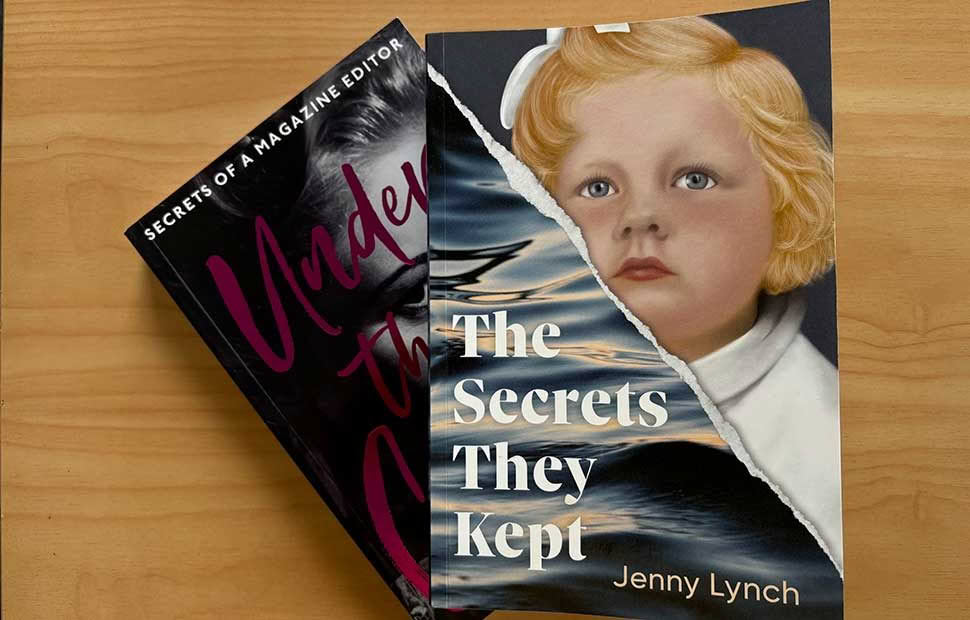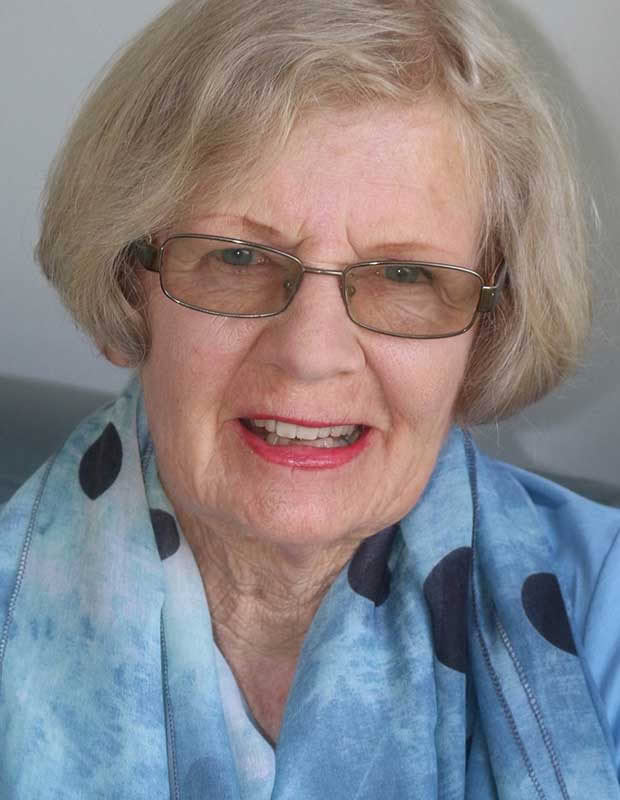Former Women’s Weekly editor publishes her first novel aged 85

Long after retiring from a successful career in magazine journalism, Jenny Lynch launches into fiction writing with a novel about a secret-keeping, deeply religious family in mid-20th century Auckland. With careers to date including a stint as “Bunny Jenny” in a Melbourne nightclub and tripping the lights fantastic as an actress, why not a new late-life career?
Words: Kate Coughlan
Jenny Lynch is mildly surprised that the launch of her novel, The Secrets They Kept, is accompanied by so much comment about her age. The octogenarian notes that writing a novel “at her age” is raising eyebrows. “I can’t see why older people are not expected to produce stuff, like anyone else?” she says. In applying her pen to fiction she joins the company of former NZ Women’s Weekly editors Sarah- Kate Lynch and Nicky Pellegrino, each with a long list of novels to their name. “Rather late to fiction aren’t I, as a former Weekly editor myself,” notes the 85-year-old Aucklander.
Jenny, the epitome of politeness and delicate blonde elegance, has steely resolve and a rich history from which to draw in her fiction as well as providing, of course, all the content for her memoirs published in 2020. The autobiography, Under the Cover, Secrets of a Magazine Editor chronicled her decades in journalism that culminated in her editorship of New Zealand’s most loved and – at the time – most widely read, women’s magazine the NZ Women’s Weekly.
One of her more colourful career interludes preceded journalism and took place in a seedy Melbourne nightclub in the 1960s. Her stint as Playboy receptionist “Bunny Jenny” might seem a little on the risque side and is oft-quoted especially now she is publicising her latest book, Secrets They Kept. However, and for the record, she was never exactly a Playboy bunny. The Melbourne restaurant-nightclub, called Playboy was a ripoff of the original Playboy Club just skirting copyright infringement and Jenny’s job involved no taking off of skirts nor any other items of clothing.
“My job was Bunny Jenny, the receptionist, the voice of the bunnies, taking bookings and speaking with an American accent. In those days an American accent was very good for
business. And I had to answer any questions that came along.”
Delivering the American accent was easy for Jenny, already an accomplished amateur actor who had left Epsom Girls Grammar in her final year for an American Field Scholarship in Minnesota near the Canadian border and, several years later, returned to the US to Manitoba near Winnipeg to study, act and work. Answering some of the questions directed at Bunny Jenny was, at times, a little harder.
“Of course, I got very dubious questions sometimes. I learned how to deal with them. However, the worst occasions for obscene questions came on Anzac Day when old diggers celebrating with a long day in the Returned Services League bar thought they’d like to outline their sexual fantasies to someone who would listen such as Bunny Jenny at the Playboy.”
“The establishment was run by a crook, who’d already survived one attempt on his life when someone had shot through his bedroom window and missed. Earlier there had been an attempt at the building where he later established the Playboy. A machine gun drive-by left bullet holes that were still visible on the outside. I wasn’t worried for my safety. When you are young, you think you are invincible.”

She says learning to deal with all of this was excellent training for her later life as a journalist and even now as a novelist. She’d been thinking about the plot for her novel for many years and it arose from a family story involving a dark secret.
“All families have secrets, don’t they? My family secret wasn’t exactly like the plot of my novel but it sparked me to think about writing a short story. Then, several years ago, the whole plot of the book just came to me. Quite out of the blue. Did I dash to my computer? No, I let it dwell and worked on it for several months on and off.”
As a career journalist, it might be expected that veering into fiction and creating characters might be challenging. Not for Jenny.
“I didn’t find it hard. Once I had given myself permission to make things up, which is an unusual experience for a journalist, I found it liberating. Developing the main character in the first person was interesting, trying to get inside her head and understand what she was really thinking and feeling. That era, of the 1970 and 1980s, is pretty clear to me so that was easy and I was able to use aspects of my life.”
Jenny also enjoyed naming her characters. Helena, her heroine, is a name she’s loved since childhood and an unattractive character she named Dougie.
“In my childhood I had known a very nasty little boy called Dougie, apologies to Dougies out there.”
Finding a title for her book was quite the slog, with every title she wished to use already taken. Some of her early journalism did provide a path to fiction. After she’d returned to New Zealand from her AFS she secured a junior writer role with the Women’s Weekly under legendary editor Jean Wishart, and was assigned to manage the horoscopes. They were written by a prominent Auckland businesswoman under the pseudonym Maorilander.
“Maorilander regarded herself as a psychic and sent in barely readable copy, which I had to be a psychic to decipher. And her horoscopes were dreadful, always business-oriented. For example, she’d write: “It is a very good week for shoe making and for the fishing industry.” What woman, taking a moment out of her busy life, wants to read in her horoscope that it is a good week for shoemaking?”
Jenny took considerable licence and, employing her fictional skills, turned the fishing industry into the seaside.
“I’d suggest it was a good week to take the family to the seaside, for a holiday or a picnic. No- one complained, not even Maorilander herself.”
What’s next for Jenny? Another novel. Well, let’s see where that imagination takes her and if another plot lands perfectly formed in her mind.
Available in good bookstores:
The Secrets They Kept
by Jenny Lynch
RRP $38
A young woman’s quest to discover the truth about her mother’s unexplained death and to discover her own identity.
Jenny’s autobiography
Under the Covers
Secrets of a magazine editor
By Jenny Lynch
Was published in 2020.

